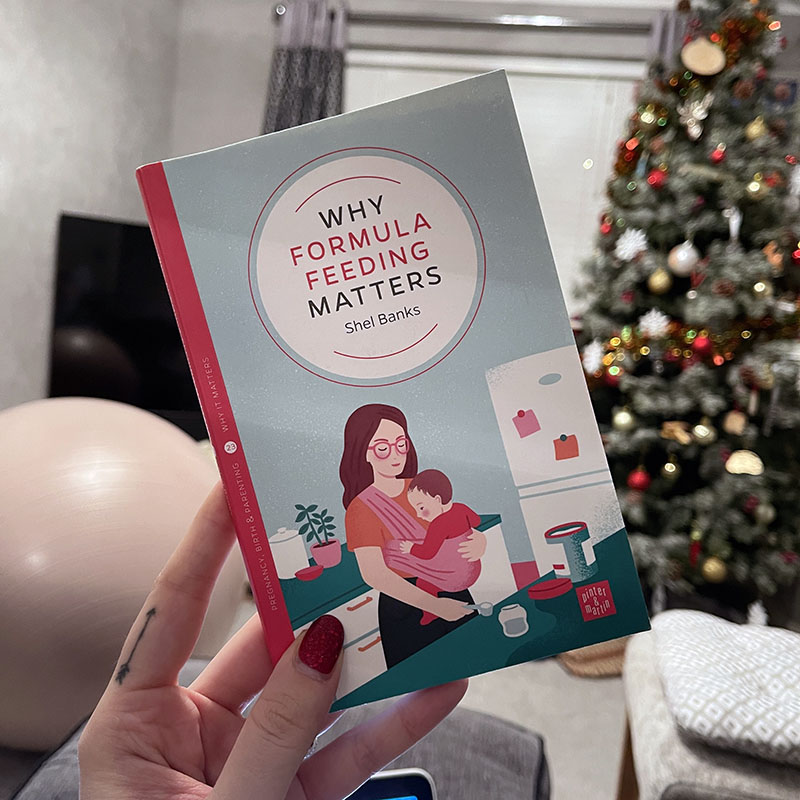One of the challenges I’ve faced in pregnancy is deciding how to feed our baby: do I breastfeed, or do we formula feed? This was before I knew about combination feeding/combi feeding, or mixed feeding as it’s also known.
My experience to date is there’s still so much pressure for women to breastfeed, and judgement for those who decide not to, regardless of their reasons (not that you have to justify your decision). I remember during my booking-in appointment, when I was 8 weeks pregnant, the student midwife asked, “Have you given any thought to how you’d like to feed your baby? There’s absolutely no judgement, we’re happy to support whatever you decide, it’s just for our notes”.
I figured that’s nice, given friends have shared in the past how much they drilled breastfeeding into them from the get-go. So I answered, “I want to exclusively formula feed”. Their response… “Okay, well you don’t have to make the decision right now, many women decide later on in pregnancy or once they give birth, that they actually want to breastfeed. There’s lots of benefits to breastmilk, so we can always discuss that at a later point”. I thought there was no judgement and that you’d support my decision regardless?
We also attended a 3-hour antenatal workshop in November which touched on the Golden Hour and how the baby will crawl the chest to feed from the breast. I asked, in a room full of 30 strangers, “Can you and baby still benefit from Golden Hour even if you’re formula feeding?”. I regretted asking it so publicly, as I felt like everyone was judging knowing I made it clear I was choosing to formula feed, and their response was so vague with, “well baby will try to find the breast regardless, but you can still have Golden Hour”. There was no further information on how you can make Golden Hour work for you when you’re offering a bottle instead of the breast, it was horrible how I felt afterwards to be honest. Plus, that didn’t give me the highest hopes for my postnatal feeding support once the baby is here.
Before I get into how I’m choosing to try and feed my baby, I want to clarify that I am not against exclusively breastfeeding. I have no judgement for those who do, although I know some who would definitely judge others for choosing to do the opposite, but hey ho. I completely understand why many Mum’s choose to exclusively breastfeed: babies get the goodness of breastmilk 24/7, bonding, health benefits for both baby and Mum, reduced risk of SIDS and it’s much cheaper than formula, however it’s not entirely free. I’ve done my research, so I’m not making this decision out of naivety. But, I have my own reasons why exclusively breastfeeding is not for me.

What is combination feeding?
You may be wondering what is combination feeding exactly, and from my own reading, it’s based on two scenarios:
- Giving baby breastmilk only via a combination of breast and bottle.
- Or giving baby a combination of breastmilk (whether via breast or bottle, or both) and formula (whether as a top up or 50/50 etc.).
Like myself, you may be choosing to read up on combi feeding due to personal choices and thinking ahead to what you know you want to avoid; the feeding being left to only yourself, or assuming only one feeding option will work for you. Or, you may be considering combo feeding because you know you want to provide breastmilk to your baby, but you want baby to be used to a bottle from the get-go, but also want your partner to be able to help feed the baby.
Why am I choosing to try mixed feeding?
Exclusively breastfeeding has never been something I’ve wanted to do, even before we were trying to conceive and once I got pregnant. This is for various reasons: I want feeding our baby to be a shared experience; I don’t want to feel like I’m latched on to 24/7 via the breast or a pump; I’m mindful of my own mental health and do not want to do anything that could negatively impact it; I don’t want the pressure of having to make breastfeeding work if I’d chosen to exclusively do it, yet suffer if it doesn’t go well; but lastly, I have benign cysts in my breasts which could impact breastfeeding or expressing, so I don’t want to rely on this being the sole way of feeding our baby when I’m already warned it could impact the success rate.
Therefore, by mixed feeding I’m able to try the best of both worlds: I’m able to bond with my baby via breastfeeding as well as offering them the goodness of breast milk (not that you can’t bond through bottle feeding, because you absolutely can). I’m able to take breaks from feeding and know that my husband is able to prepare a bottle and feed our baby without relying on me to supply the milk. It also makes me happy to know that I’m not denying him the opportunity to feed his baby, and instead giving him the chance to feel like he’s contributing to the feeding journey by being more hands-on with preparing bottles too.
Collecting colostrum
Before I knew about combi feeding and was considering formula only, I knew I still wanted to harvest my colostrum from 37 weeks pregnant and offer this to our baby once she was born. I’d read all about the benefits of colostrum, so for me it was a no brainer. It was from there when I started asking questions around how I harvest this and store it, that mixed feeding was introduced to me.
Benefits of combination feeding
As mentioned above, I get to try the best of both worlds by combi feeding. Formula feeding still has its benefits, regardless of what EBF Mum’s out there may say. After all, if it wasn’t safe for your baby to consume then it wouldn’t be available to buy, and certainly wouldn’t be offered as a “top-up” option by healthcare professionals for those who are exclusively breastfeeding but the baby is struggling to put on weight.
For me, after all my research, here’s what I think the main benefits of combination feeding are that have ticked the boxes for me:
- Mum gets regular breaks
- Baby gets the benefits of breast milk
- Baby gets used to both breast and bottle to help when others want/need to feed them
- Feeding the baby can be shared between you and your partner/support bubble
Why combination feeding from birth matters
By combination feeding from birth we’re able to get the baby used to both the breast and bottle from an early stage. This means we can hopefully avoid her refusing bottles from her Dad, as well as family and friends who offer to help. A technique that’s been advised to also support this is paced feeding. This is recommended to help the baby control when they’re ready for the bottle, but to also avoid overfeeding.
Resources I recommend for mixed feeding
I’m shocked, in a good way, at the support I’ve had around this decision already. As part of this support, lots of resources have been shared with me which I highly recommend.

Why Formula Feeding Matters by Shel Banks
This is a short book which I was able to finish in one afternoon, but talks you through everything you’d need or want to know about formula feeding. It goes into the history (if that interests you at all), all the ingredients, the different types of formula, all the regulations companies have to follow (but also explaining how some get around these, just so you’re well informed), the pricing per brand of formula, reasons why you may be formula feeding, and also explaining follow-on milks which are advertised for 6 months+ which actually – *spoiler* – are not necessary. It’s a really good read, all evidence-based and written by an infant feeding specialist who supports families who are formula feeding. This book does share some facts which you might find upsetting or triggering, but I don’t believe it’s written in a way to make you feel that way, it’s just there to give you all the information you need. You can find it here*.
Mixed Up | Combination Feeding by Choice or Necessity by Lucy Ruddle, IBCLC
This is a bigger book and took me two days to get through – I was keen to read up on everything fast given I started all this research when I was 33 weeks pregnant. This, again, is evidence-based and was written by a Lactation Consultant. The book goes through the benefits of mixed feeding, potential problems, why you may decide to combi-feed, formula, breast milk, milk sharing, how to look out for hunger cues, bottle alternatives, how to make this method work for you, and also real stories from those who have done combination feeding. Again, there are facts in this book which you may find triggering, but they are actually placed in grey boxes so you can skip those sections if you aren’t in the right frame of mind to read them, or want to avoid them altogether, which I think is great! You can find it here*.
Why It Matters series by Pinter & Martin
The first book I mentioned, Why Formula Feeding Matters, is part of this series by this publisher. I highly recommend checking out all the books they have which are evidence-based ideas on pregnancy, birth and parenting. The series has a book for all important topics like feeding, trauma*, postnatal depression*, hypnobirthing, induction*, weaning*, hormones, mothering and so on. They’re only small, approximately 150-page books on each subject and most importantly, they’re evidence-based. They’re not opinion-based, they simply give you the facts so you can make your own informed decisions.
Have you tried combination feeding, or know someone who has?
I am not a healthcare professional, the above are my opinions and learnings from my own research online, in books and by speaking with my midwife.
*affiliate links.
